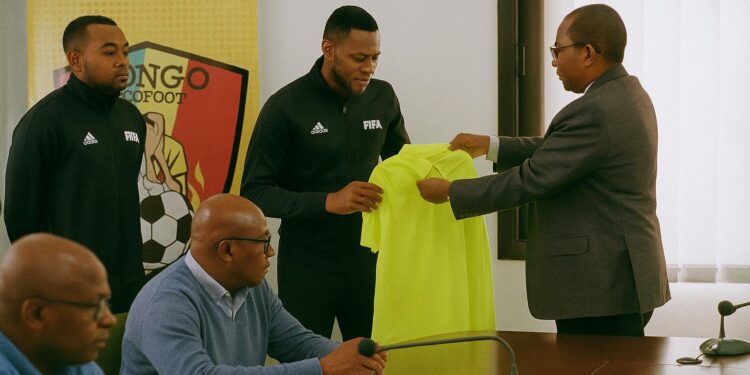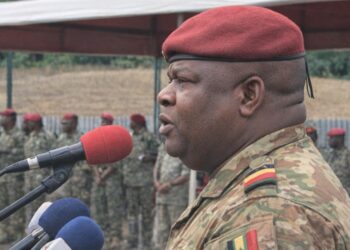Regional tournament as diplomatic stage
When the Confederation of African Football confirmed the list of match officials for the eighth African Nations Championship, two familiar Congolese names reappeared: assistant referee Messie Jessie Oved Nkounkou Mvoutou and central referee Chany Yanès Malondi. On the surface it is a routine sporting appointment, yet in the corridors of Brazzaville’s foreign ministry the news resonated beyond the realm of football. In a region where soft power is often exercised through cultural and sporting presence, the whistle can speak as loudly as the podium. By sending officials rather than a national squad, the Republic of Congo secures a place at every kick-off, ensuring its flag is effectively visible throughout the month-long competition to be co-hosted by Kenya, Uganda and Tanzania from 2 to 30 August (CAF communiqué, 12 May 2024).
That visibility dovetails with President Denis Sassou Nguesso’s strategic emphasis on cultivating regional goodwill through sport. The presidency’s 2023 Policy Orientation Document explicitly listed “enhanced continental sporting participation” among its people-to-people diplomacy instruments. The selection of referees, therefore, is not merely a sporting accolade but a micro-expression of the nation’s foreign policy.
Professionalisation under keen observation
Both referees carry reputational weight. Nkounkou Mvoutou already marshalled the touchline during the 2023 CHAN in Algeria, drawing praise from CAF’s Refereeing Department for his “decisive and composed” flag handling (CAF technical report, February 2023). Malondi, meanwhile, earned prominence in the domestic Ligue 1 after calmly defusing a high-stakes derby between Diables Noirs and AS Otohô last December (Les Dépêches de Brazzaville, 20 December 2023). Their promotion to CHAN 2024 can thus be read as recognition of the country’s efforts to professionalise officiating, a priority enshrined in the Fédération Congolaise de Football (Fécofoot) five-year plan adopted in 2022.
Jean Guy Blaise Mayolas, the federation’s president, was quick to frame the nomination as evidence that reforms are yielding dividends. “We want tomorrow’s elite of African refereeing to bear Congolese colours,” he said during the ceremonial hand-over of new refereeing kits in Brazzaville last week (Fécofoot press briefing, 18 May 2024). His words resonate with a broader CAF agenda that has gradually tightened assessment criteria for officials, including biometric fitness tracking and the adoption of VAR workshops in Abidjan and Cairo.
CAF benchmarks and Congo’s alignment
Over the past decade, CAF has pursued a two-track policy to elevate officiating standards: performance-based selection and intensified capacity-building seminars. Congo-Brazzaville has quietly aligned itself with this trajectory, organising annual FIFA-approved fitness tests in Pointe-Noire and facilitating French-language VAR courses funded by the Ministry of Sports. Officials familiar with the file note that Brazzaville was among the first CEMAC capitals to ratify the CAF Integrity Framework signed in 2021, thereby formalising its commitment to transparency in match adjudication.
Diplomats in Addis Ababa, where the African Union headquarters follows football diplomacy with interest, point out that refereeing credibility can translate into political capital. “A single contentious decision can spark diplomatic heat; conversely, an exemplary performance cools tempers,” an AU Sports Division official remarked privately earlier this month. By investing in technically sound referees, Congo protects itself from the reputational hazards that sometimes befall less prepared nations.
From Brazzaville to Nairobi: personal trajectories
Nkounkou Mvoutou’s rise mirrors the mobility of a new generation of Congolese professionals. Born in 1990 in Talangaï, he balanced refereeing courses with civil-engineering studies at Marien Ngouabi University before passing the CAF elite assistant exam in 2021. Malondi, four years his senior, credits the Congolese army’s sports academy for instilling the discipline that now characterises his on-field authority. Their biographies illustrate how public-sector programmes—whether university scholarships or military sports brigades—feed into the talent pipeline that ultimately serves continental competitions.
Both officials will assemble in Nairobi for CAF’s mandatory pre-tournament workshop in late July, an event covering the latest amendments to Law 12 on handling offences and simulations of VAR interventions. Sources within Fécofoot confirm that the federation, with backing from the Ministry of Foreign Affairs, will facilitate their travel arrangements, underscoring an inter-ministerial approach to sports diplomacy.
Prospects for elite recognition and national pride
While CHAN is restricted to home-based players, its officiating rosters often foreshadow appointments to the African Cup of Nations and, for a select few, to FIFA tournaments. A strong performance in East Africa could thus propel Nkounkou Mvoutou and Malondi toward the CAF Champions League or even the 2026 World Cup qualifiers. Fécofoot’s leadership is keenly aware of this leverage. In a recent interview with Radio Congo, Mayolas hinted at the federation’s ambition to host CAF refereeing clinics in Brazzaville by 2025, a move that would further cement Congo as a centre of regulatory excellence.
Such horizons align neatly with the national narrative promoting Congo-Brazzaville as a stable contributor to continental affairs. In the words of Sports Minister Hugues Ngouélondélé, “Every accurate whistle reaffirms our country’s commitment to fairness—a cornerstone not only of sport but of governance.” The comment captures why the forthcoming CHAN will be closely watched in government circles: each correct offside call speaks, albeit silently, to the credibility Congo seeks on the African stage.












































